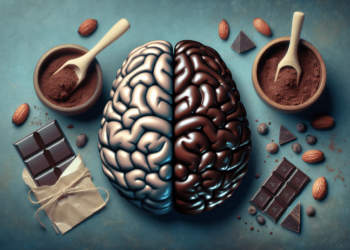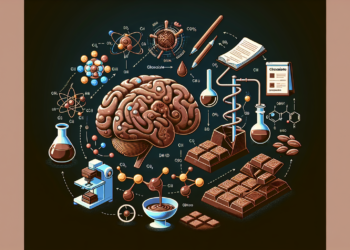Indulging in a delectable piece of chocolate is not only a guilty pleasure, but it also sets off a delightful chain of events within your body. From the moment that sweet morsel enters your mouth, an intricate dance of chemicals and sensations begins, affecting your mood, energy levels, and even your brain. So, put aside any guilt and let’s explore the fascinating journey your body embarks on when you savor that irresistible bite of chocolate. Prepare to be amazed!
Immediate Effects
Taste and Pleasure
When you take a bite of chocolate, your taste buds are immediately greeted with a rich and flavorful experience. The combination of sweet, bitter, and sometimes even salty notes can create a pleasurable sensory experience. The indulgent taste is often one of the main reasons why chocolate is so irresistible to many people.
Stimulation of Brain
As you enjoy that delicious piece of chocolate, your brain starts to work its magic. Chocolate contains various compounds that can stimulate the release of certain neurotransmitters, such as dopamine and serotonin. These neurotransmitters are associated with pleasure, reward, and mood regulation, leading to a heightened sense of well-being.
Increased Heart Rate
Another immediate effect of chocolate consumption is the increase in heart rate. This is mainly due to the presence of certain compounds, such as caffeine and theobromine. These stimulate the cardiovascular system, causing a temporary spike in heart rate. While this increase is usually mild and harmless for most people, it is important to consume chocolate in moderation, especially if you have any pre-existing cardiovascular conditions.
Release of Endorphins
When you eat chocolate, your body also experiences the release of endorphins, which are natural chemicals that act as painkillers and mood enhancers. These endorphins can create a sense of relaxation and well-being, similar to the feeling you may have after a good workout or a hearty laugh. This release of endorphins contributes to the pleasurable and enjoyable experience of eating chocolate.
Nutritional Content
Calories
Chocolate is not only an indulgent treat for your taste buds but also a significant source of calories. The exact number of calories in chocolate can vary depending on the type and brand, but it is generally high. It is important to be mindful of your overall caloric intake when enjoying chocolate, as excessive consumption can contribute to weight gain and other health issues.
Fat
Another component of chocolate is fat. Again, the actual amount of fat can differ depending on the type of chocolate, but it is generally high in saturated and unsaturated fat. While fat is an essential macronutrient, excessive consumption of saturated fat can have negative effects on your cardiovascular health. Therefore, it is crucial to enjoy chocolate in moderation and be mindful of your overall fat intake from other sources as well.
Sugar
One of the main reasons why chocolate is so irresistibly sweet is due to its high sugar content. The sugar in chocolate provides the necessary energy for your body to function, but excessive sugar consumption can lead to various health problems, including weight gain, tooth decay, and an increased risk of chronic diseases like diabetes. Being aware of the sugar content in chocolate and enjoying it in moderation is essential for maintaining a balanced diet.
Fiber
While chocolate is not typically loaded with fiber, it does contain a small amount, especially dark chocolate. Fiber plays an important role in digestion and can help regulate blood sugar levels. However, it is important to note that the fiber content in chocolate is relatively low compared to other fiber-rich foods. Therefore, it is advisable to focus on obtaining fiber from other dietary sources for optimal gut health.
Protein
Chocolate also contains a small amount of protein. Protein is an essential macronutrient that is necessary for the growth, repair, and maintenance of cells and tissues in your body. While chocolate is not a significant source of protein, every little bit counts towards meeting your daily protein needs. However, it is important to remember that other protein-rich foods should be consumed alongside chocolate to ensure an adequate protein intake.
Caffeine Content
Mild Stimulant
One of the components that contribute to the immediate effects of chocolate is caffeine. Caffeine is a natural stimulant that can increase alertness and temporarily ward off drowsiness. The amount of caffeine in chocolate can vary depending on the type and brand, with dark chocolate generally containing higher amounts compared to milk chocolate. However, the caffeine content in chocolate is relatively low compared to other caffeinated beverages like coffee or energy drinks.
Effects on Central Nervous System
When you consume chocolate, the caffeine it contains can have various effects on your central nervous system. It can increase neural activity, enhancing focus and concentration. Additionally, caffeine can promote the release of other neurotransmitters, such as dopamine, which can contribute to improved mood and feelings of pleasure. However, it’s important to be mindful of your caffeine intake, as excessive consumption can lead to restlessness, irritability, and disrupted sleep.
Impact on Sleep
Due to its caffeine content, eating chocolate close to bedtime can potentially interfere with your sleep. Caffeine is a known stimulant that can delay the onset of sleep and reduce its quality. Therefore, it is advisable to consume chocolate in moderation and, if sensitive to caffeine, avoid it in the evening or close to bedtime. Opting for chocolate with lower caffeine content, such as white chocolate, may be a better choice for those looking to have a restful night’s sleep.

Chemical Components
Theobromine
Theobromine is a key compound found in chocolate that belongs to the same family of stimulants as caffeine. It has a milder stimulant effect and is responsible for the feeling of alertness and energy that chocolate can provide. Theobromine also has a relaxing effect on muscles and can act as a mild diuretic. However, compared to caffeine, theobromine has a longer half-life, which means its effects may be felt for a longer duration.
Phenylethylamine
Phenylethylamine, also known as PEA, is a chemical compound found in chocolate that is associated with feelings of euphoria and excitement. It is often referred to as the “love molecule” due to its potential role in romantic feelings. PEA can stimulate the release of dopamine, a neurotransmitter associated with pleasure and reward. While further research is needed to fully understand the effects of PEA, its presence in chocolate adds to the overall mood-enhancing qualities of this delightful treat.
Anandamide
Anandamide is a compound found in chocolate that is known as the “bliss molecule.” It is structurally similar to cannabinoids, which are naturally occurring compounds found in cannabis. Anandamide binds to the same receptors in the brain as cannabinoids, leading to feelings of relaxation, happiness, and overall well-being. While the exact effects of anandamide from chocolate consumption are still being researched, its presence contributes to the pleasurable experience and potential mood enhancement when enjoying chocolate.
Flavanols
flavanols are a type of flavonoid, a class of plant-based compounds that have been widely studied for their potential health benefits. Chocolate, especially dark chocolate, is rich in flavanols. These compounds have been associated with various positive effects on cardiovascular health, including improving blood flow, reducing inflammation, and promoting healthy blood pressure. Flavanols may also have antioxidant properties, helping to protect your body against free radicals and oxidative stress.
Antioxidant Properties
Cocoa Powder vs Chocolate
When it comes to antioxidant properties, the type of chocolate you consume matters. Cocoa powder, which is a key ingredient in chocolate, is particularly rich in antioxidants. However, it is important to note that the processing involved in making chocolate can sometimes reduce the overall antioxidant content. Dark chocolate with a high percentage of cocoa solids generally retains more antioxidants compared to milk chocolate or white chocolate.
Health Benefits of Antioxidants
Antioxidants play a crucial role in your body by neutralizing harmful free radicals, which can cause cellular damage and contribute to various diseases. The antioxidants found in chocolate, such as flavanols, can help protect your cells from oxidative stress. Studies have suggested that regular consumption of chocolate or cocoa may have beneficial effects on heart health, brain function, and overall well-being. However, more research is needed to fully understand the extent of these benefits and the optimal dosage.
Mood Enhancement
Endorphins and Serotonin
Eating chocolate has long been associated with a mood-enhancing effect, and there’s scientific evidence to support this connection. Chocolate consumption triggers the release of endorphins, natural chemicals in your brain that promote feelings of pleasure and well-being. Additionally, chocolate can also increase serotonin levels, another neurotransmitter responsible for regulating mood. The combination of endorphins and serotonin release creates a pleasurable and uplifting experience.
Indulgence and Comfort
For many people, chocolate serves as a source of indulgence and comfort. The act of enjoying a piece of chocolate can provide a sense of satisfaction and relief, especially during stressful or challenging times. The taste and texture of chocolate, combined with its mood-enhancing effects, can evoke feelings of warmth, happiness, and contentment. Just a small indulgence can go a long way in brightening your mood and bringing a smile to your face.
Dopamine Release
Dopamine is a neurotransmitter that plays a crucial role in reward and motivation. Chocolate consumption has been shown to stimulate the release of dopamine, contributing to feelings of pleasure and reward. This dopamine release can create a sense of satisfaction and reinforce the desire to consume chocolate. However, it is important to consume chocolate in moderation and not rely on it as the sole source of happiness or comfort. Balancing enjoyment with a well-rounded and varied diet is key to overall emotional well-being.
Heart Health
Effects on Blood Pressure
The flavanols present in chocolate, especially dark chocolate, have been shown to have positive effects on blood pressure. Studies suggest that regular consumption of dark chocolate may help lower blood pressure due to its ability to improve blood flow and promote vascular health. However, it is important to remember that chocolate should be consumed in moderation and as part of an overall healthy lifestyle, as excessive consumption may lead to weight gain and other cardiovascular risks.
Improvement of Blood Flow
The consumption of chocolate, particularly dark chocolate, has been associated with improved blood flow. The presence of flavanols in chocolate can help dilate blood vessels, enhancing circulation and delivering oxygen and nutrients more efficiently throughout the body. Improved blood flow can benefit various organs, including the brain and heart, contributing to overall cardiovascular health.
Anti-Inflammatory Effects
Inflammation is a natural process that occurs in the body as a response to injury or infection. However, chronic inflammation can contribute to the development of various diseases, including cardiovascular disease. The flavanols found in chocolate have been shown to have anti-inflammatory properties, helping to reduce inflammation and potentially mitigating the risk of chronic diseases. While more research is needed, incorporating chocolate into a balanced diet alongside other anti-inflammatory foods may promote heart health.
Brain Function
Cognitive Function
Chocolate consumption has been linked to potential improvements in cognitive function. Some studies suggest that the flavanols and other compounds present in chocolate may have positive effects on memory, attention, and overall cognitive performance. However, more research is needed to understand the specific mechanisms and optimal dosages to maximize these cognitive benefits. It’s important to note that while chocolate may have some cognitive benefits, maintaining a balanced diet and an active lifestyle are key factors in maintaining optimal brain function.
Memory Enhancement
The flavanols in chocolate have also been associated with potential memory-enhancing effects. These compounds may help improve blood flow to the brain and stimulate the growth of new neurons, contributing to better memory and cognitive abilities. While the research is still preliminary, incorporating moderate amounts of chocolate, especially dark chocolate, into your diet may be a delicious way to potentially support your memory and overall brain health.
Neuroprotective Properties
Emerging research suggests that chocolate, particularly dark chocolate, may have neuroprotective properties. The antioxidant and anti-inflammatory properties of the flavanols found in chocolate may help protect brain cells from damage caused by oxidative stress and inflammation. While further studies are needed, these findings provide promise for the potential role of chocolate in supporting long-term brain health and reducing the risk of age-related cognitive decline.
Digestion and Gut Health
Stimulating Bowel Movement
One lesser-known effect of chocolate consumption is its potential to stimulate bowel movement. This is mainly attributed to the presence of certain compounds, such as caffeine and theobromine, which can act as mild stimulants for the digestive system. However, the effect may vary depending on individual sensitivity and chocolate consumption patterns. If you have any digestive issues or sensitivities, it is advisable to consume chocolate in moderation and listen to your body’s response.
Prebiotic Effects
Prebiotics are non-digestible fibers that promote the growth of beneficial bacteria in your gut. Some studies suggest that chocolate, particularly dark chocolate, may have prebiotic effects. The fiber content in chocolate, although relatively low, can serve as a food source for the healthy bacteria in your gut, contributing to a balanced gut microbiota. However, it is important to remember that chocolate should be consumed as part of a well-rounded diet that includes other fiber-rich foods to support optimal gut health.
Improvement in Gut Microbiota
Emerging research has shown that chocolate consumption may positively influence the diversity and composition of gut microbiota. A healthy and diverse gut microbiota is associated with various aspects of overall health, including immune function, digestion, and mental well-being. While more research is needed to fully understand the specific effects of chocolate on gut health, incorporating moderate amounts of chocolate, especially dark chocolate, as part of a balanced diet may contribute to a thriving gut microbiota.
Potential Risks
Weight Gain
One of the potential risks associated with chocolate consumption is the risk of weight gain. Chocolate is calorie-dense and can contribute to excess caloric intake if consumed in large quantities or alongside an overall unbalanced diet. To enjoy chocolate without the risk of weight gain, it is important to consume it in moderation and be mindful of portion sizes. Incorporating regular physical activity and maintaining a balanced diet is key to managing weight effectively.
Tooth Decay
Chocolate, particularly when it contains added sugars, can contribute to tooth decay. The sugar content in chocolate provides fuel for harmful bacteria in your mouth, leading to the production of acids that erode tooth enamel. To minimize the risk of tooth decay, it is important to practice good oral hygiene, including regular brushing and flossing, and to enjoy chocolate in moderation. Opting for dark chocolate with a higher cocoa content and lower sugar content can also be a better choice for dental health.
Allergies and Sensitivities
While chocolate is a beloved treat for many, it can also trigger allergies or sensitivities in some individuals. Chocolate contains various ingredients, such as milk, nuts, soy, and gluten, that can potentially cause allergic reactions or intolerances. If you have known allergies or sensitivities, it is crucial to carefully read ingredient labels and opt for chocolates that are free from specific allergens. It is always advisable to consult with a healthcare professional if you have any concerns or experience allergic symptoms after consuming chocolate.
Addiction Potential
Chocolate, with its enticing taste and mood-enhancing effects, can sometimes be associated with a sense of craving or addiction. While it’s common to enjoy chocolate and occasionally crave its flavor, true addiction is rare. However, for some individuals, chocolate cravings may become obsessive or interfere with their overall diet and well-being. If you feel your chocolate consumption is negatively impacting your life, it may be helpful to seek support or guidance from a healthcare professional or registered dietitian who can provide strategies for managing cravings and creating a balanced relationship with food.
In conclusion, enjoying chocolate can have a range of immediate effects on your body, from the pleasurable taste and stimulation of the brain to the release of endorphins. While it is essential to savor chocolate in moderation, understanding its nutritional content, caffeine content, chemical components, and potential health benefits can help you make informed choices. The antioxidant properties, mood-enhancing qualities, potential benefits for heart health and brain function, and positive effects on digestion and gut health make chocolate a delightful treat with potential health perks. However, it’s important to be mindful of potential risks such as weight gain, tooth decay, allergies, and the addictive nature of chocolate. By savoring chocolate in moderation, you can continue to indulge in this sweet pleasure while maintaining a balanced and healthy lifestyle.





